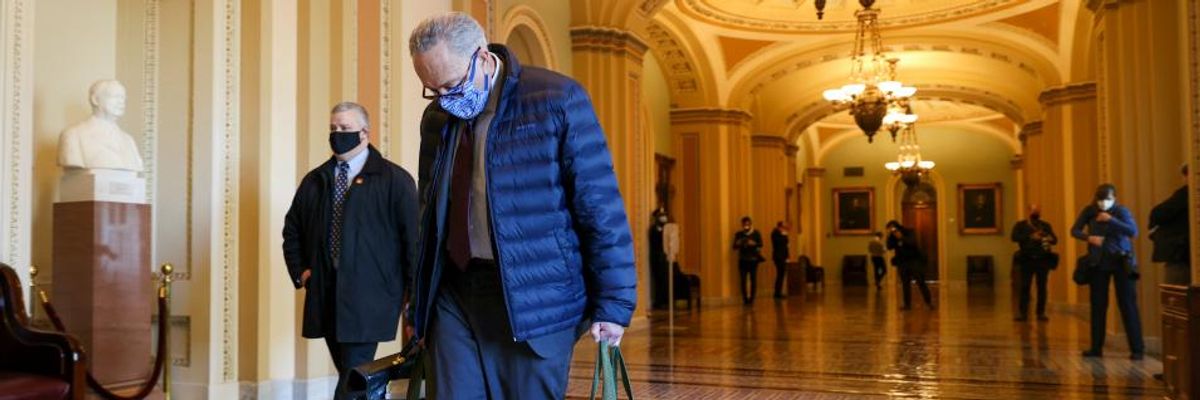After Senate Republicans repeatedly stymied a Sen. Bernie Sanders-led effort to force a clean up-or-down vote on $2,000 direct payments, dozens of Democrats late Wednesday joined Majority Leader Mitch McConnell in allowing the chamber to move ahead with the process of overriding President Donald Trump's veto of the $740 billion National Defense Authorization Act.
The vote on the motion to proceed to the NDAA veto override came after Sanders, Senate Minority Leader Chuck Schumer (D-N.Y.), and others denied McConnell unanimous consent this week to speedily advance the behemoth military spending bill, a tactic aimed at securing a clean vote on House-passed legislation that would deliver $2,000 payments to most Americans.
"Maybe my colleague, the Majority Leader, might want to get on the phone and start talking to working families in Kentucky and find out how they feel about the need for immediate help in terms of a $2,000 check per adult."
--Sen. Bernie Sanders
But McConnell, joined by Sens. Pat Toomey (R-Pa.) and John Cornyn (R-Texas), rejected demands for a vote on the direct payments once again on Wednesday, declaring that the checks would benefit "millionaires and billionaires"--a complaint that was both false and shamelessly hypocritical, given that the same Republicans had no issue with passing President Donald Trump's $1.5 trillion in tax cuts for the wealthy in 2017.
Thanks to the delay tactics that Sanders spearheaded, McConnell was forced to hold a vote Wednesday on a formal motion to proceed to the NDAA. But ultimately, Sanders was one of just six members of the Senate Democratic caucus to vote against the motion, which succeeded by an overwhelming margin of 80-12.
Sens. Ed Markey (D-Mass.), Jeff Merkley (D-Ore.), Chris Van Hollen (D-Md.), Elizabeth Warren (D-Mass.), and Ron Wyden (D-Ore.) joined the Vermont senator in opposing the motion. Six Republicans also voted no.
In total, 41 Democrats--including Schumer and Vice President-elect Kamala Harris--voted for the motion, paving the way for an override of Trump's NDAA veto and effectively killing the prospect of a vote on $2,000 direct payments before the next Congress. View the full roll call here.
A final vote on the NDAA veto override is expected by January 2. Sanders made clear following the motion's passage Wednesday that he plans to continue pushing for a vote on the direct payments.
"The sheer scale of Wednesday's Democratic surrender was truly a sight to behold," wroteThe Daily Poster's David Sirota and Andrew Perez. "And it probably ended the chance for more immediate aid to millions of Americans facing eviction, starvation, and bankruptcy... Democratic senators in fact provided the majority of the votes for the measure that lets the defense bill proceed without a vote on the $2,000 checks."
Ahead of Wednesday's vote, Sanders took Republican senators to task for standing in the way of robust direct relief for their constituents amid widespread hunger, surging poverty, and a looming eviction crisis. McConnell, a Kentucky Republican, said during his floor remarks that the Senate is "not going to be bullied into rushing out more borrowed money into the hands of the Democrats' rich friends who don't need the help."
"Let me just make it clear for the Majority Leader that 10 out of the poorest 25 counties in the United States of America are located in Kentucky," Sanders said in response. "So maybe my colleague, the Majority Leader, might want to get on the phone and start talking to working families in Kentucky and find out how they feel about the need for immediate help in terms of a $2,000 check per adult. And I have the strong feeling that the people of Kentucky will respond no differently than the people of Vermont or New York."
Sen. Ed Markey joined Sanders in demanding a vote on the $2,000 checks, declaring, "He is right. The Republicans are wrong on this issue, on every single part of this debate. Senator Sanders is right. The Republicans are wrong."
"We're in the middle of an unprecedented crisis in our country," Markey said. "We have a healthcare crisis. We have an unemployment crisis. We have a hunger crisis. We have a housing crisis. We have an addiction crisis. We have a moral crisis in this country. The United States government should be responding to the needs, to the desperation, of families in our country at this time."

